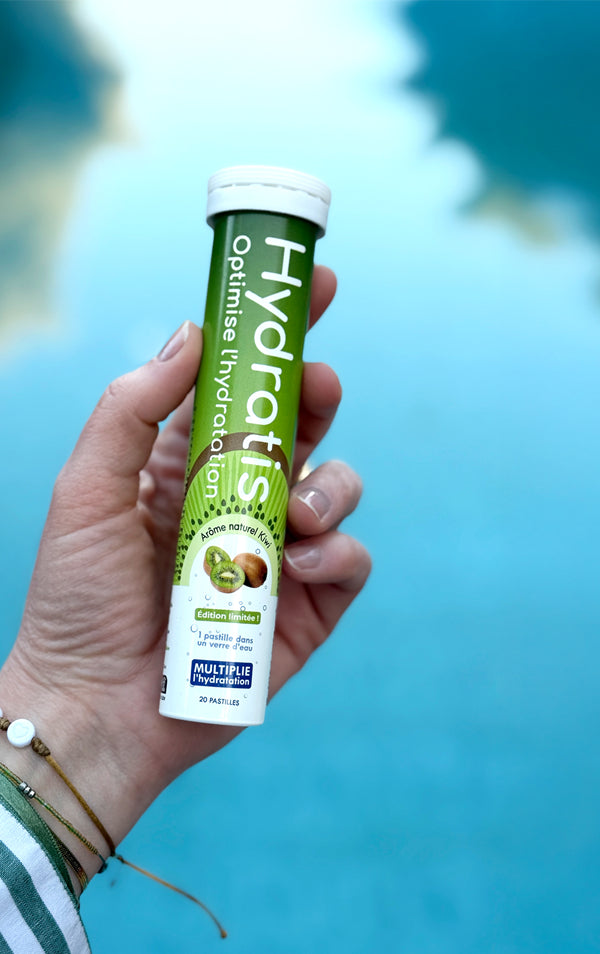During pregnancy, hydration needs naturally increase . A pregnant woman's body must not only function for two but also respond to numerous internal changes. Drinking regularly becomes a valuable habit for maintaining the well-being of both the pregnant woman and the unborn baby. However, certain common episodes such as nausea, vomiting , or simply forgetting to drink can lead to an imbalance. Knowing how to recognize the symptoms of dehydration , understanding the risks, and adopting the right habits can help prevent potential complications.
Why is drinking so important during pregnancy?
Water: a vital support for mother and child
This fluid plays a fundamental role in all the body's major functions, and even more so during pregnancy! It is involved in the formation of amniotic fluid, temperature regulation, digestion, blood circulation, and waste elimination. It also supports the kidneys, which are under considerable strain during this period. Well-hydrated skin is also a good indicator of the body's overall balance.
At this stage, it is also useful to recall some physiological landmarks: the human body is composed mostly of water – about 60% in a healthy adult, and up to 80% in an infant.
In pregnant women, this proportion increases significantly. Indeed, the total amount of body water increases by 6 to 8 liters during pregnancy, thus contributing to physiological weight gain.
This excess water is distributed between the fetus, the amniotic fluid, the placenta, as well as the mother's blood and extracellular volumes.

Increased needs from the outset
From the first weeks of pregnancy, blood volume increases, perspiration may intensify, and the kidneys filter more effectively. Increased blood loss also occurs in cases of gastroenteritis or persistent vomiting. These situations require appropriate management and, sometimes, advice from your doctor to adjust fluid intake or consider medication or additional treatments.
Quickly identifying the causes of these water losses is very important in order to react as soon as the first worrying signs appear.
Signs and dangers associated with fluid deficiency
How to recognize a water deficit?
A gradual decrease in intake over a week can lead to unusual fatigue , frequent headaches , dry mouth , or a persistent feeling of heat. Dark or infrequent urine are also common indicators. It's also helpful to monitor your hydration levels throughout the day, especially in the morning or if you are taking medication. A hydration chart or an assessment during a routine checkup can help detect the beginning of an imbalance.
The risks for the mother and baby
In cases of prolonged dehydration, various problems may arise: urinary tract infections , premature contractions, slowed digestion, or circulatory issues. The effects on the kidneys are not immediate but can develop gradually if the situation persists. This is especially true for women with specific sensitivities, those with high-risk pregnancies, or those experiencing severe vomiting. Insufficient hydration can also disrupt the proper development of the fetus . Therefore, if you have any concerns, we recommend consulting a healthcare professional.
How to avoid fluid loss during pregnancy?
Best practices to adopt
To avoid dehydration and hyperemesis gravidarum (severe vomiting), it is recommended to Drink regularly, without waiting for the feeling of thirst. Spreading your intake throughout the day, favoring higher intakes during hot periods or after moderate physical activity, will help to better regulate your fluid balance.
On average, a glass of water every hour is a good starting point, especially at the beginning of the day or after each meal. Using a reusable water bottle is also a good idea. This helps you visualize your intake and makes tracking more convenient, particularly on busy days.
Tips for staying well hydrated
It's not necessary to drink only plain water. Other forms can effectively contribute to your hydration needs: soups, herbal teas, broths, and homemade flavored drinks (made with lemon, mint, or cucumber, for example). These alternatives are particularly helpful if you're prone to nausea, especially during the first trimester. Fruits with a high water content, such as watermelon, melon, oranges, and cucumbers, are also excellent choices. Incorporating these foods into your meals or snacks naturally contributes to your daily intake. As mentioned earlier, we also recommend tracking your hydration using a chart or a mobile app to ensure you're drinking enough.
Midwife's advice
"Drinking small amounts frequently is more effective than large quantities all at once. The body absorbs better, and this reduces digestive discomfort."
What type of water should I drink during pregnancy?
Tap water vs bottled water: which to choose?
Tap water is generally safe, but it's recommended to check its local composition (nitrate, fluoride, and sodium levels). Bottled water with low mineral content may be preferable if you want to limit your intake of certain minerals. For women prone to bloating, a lightly mineralized still water is recommended.
What about sparkling, flavored, and filtered waters?
-
Sparkling water is not prohibited, but it can cause bloating or digestive discomfort.
-
As for commercially produced flavored drinks , they should be limited, as they often contain added sugars, sweeteners or additives that are not recommended during pregnancy.
-
Using a home reverse osmosis system can be beneficial for filtering tap water, especially if its taste or mineral content is unpleasant.
Eating also involves absorbing liquid.
Certain foods naturally contribute to your hydration . Fruits, steamed vegetables, soups, plain yogurt, and unsweetened compotes are rich in water and easy to incorporate into your daily diet. They provide a significant source of fluids, especially if you have difficulty drinking large quantities. For example, a vegetable soup or a serving of steamed zucchini can contain over 90% water, making it a valuable ally in preventing dehydration!
Limit: salty or processed foods
Salty or ultra-processed foods (chips, ready-made meals, savory biscuits) can hinder fluid absorption because they increase hydration needs . It is best to limit their consumption, especially during periods when the body is already under greater stress.
Top 5 hydrating foods

Here are 5 highly hydrating foods you can eat during your pregnancy:
- Cucumber
- Watermelon
- Orange
- Zucchini
- Homemade soup
During breastfeeding: should you drink even more?
Hydration needs increase further during breastfeeding. Milk production uses approximately 700 ml of fluid per day. This production results in a significant daily fluid loss that must be replenished. It is therefore advisable to drink a glass of water before or after each feeding, to add water-rich foods to the diet, and to be attentive to fatigue or dry mouth.
Conclusion: Preventing fluid deficiency is a simple but essential step.
Maintaining a good water balance helps preserve your energy, ensures proper kidney function, reduces minor digestive and circulatory discomfort, and prevents many pregnancy-related risks. By adopting simple habits, you can reduce the risk of complications and contribute to your well-being and that of your baby. Listen to your body, adjust your intake as needed, and don't hesitate to consult a healthcare professional if you have any concerns.
FAQ
How can you tell if you are dehydrated during pregnancy?
Fatigue, dark urine, dry mouth, dizziness: these signs should alert you. If you have any doubts, professional advice may be helpful.
What are the symptoms of insufficient fluid during pregnancy?
They vary but include fatigue, headache, dry mouth, feeling hot, and constipation. If in doubt or if symptoms are severe, consult a doctor.
How to rehydrate a pregnant woman?
Drink regularly, consume fruits rich in water, and adjust intake according to activity.
Is it dangerous not to drink enough water while pregnant?
Yes. Insufficient intake can lead to urinary and digestive complications, or have consequences for the kidneys.
Bibliography
Public Health Agency of Canada. (n.d.). Healthy Pregnancy Guide . Government of Canada. https://www.canada.ca/en/public-health/services/health-promotion/healthy-pregnancy/healthy-pregnancy-guide.html
Sainte-Justine University Hospital Center. (n.d.). Nausea and vomiting during pregnancy . https://www.chusj.org/fr/soins-services/C/complications-de-grossesse/complications-mere/Complications/nausees
Chesley, L. C. (1980). Hypertension in pregnancy: Definitions, familial factors, and remote consequences. Seminars in Perinatology, 4 (1), 63–72. https://doi.org/10.1016/S0146-0005(80)80030-6
Health Insurance. (n.d.). Nausea and vomiting during pregnancy . https://www.ameli.fr/assure/sante/themes/nausees-et-vomissements-pendant-la-grossesse/nausees-vomissements-grossesse
Ministry of Health and Prevention. (2012). Guide for healthcare professionals regarding pregnant women . https://sante.gouv.fr/IMG/pdf/guide_pro_femmes_enceintes.pdf
MSD Manuals. (nd). Hyperemesis gravidarum . https://www.msdmanuals.com/fr/accueil/probl%C3%A8mes-de-sant%C3%A9-de-la-femme/complications-de-la-grossesse/hyperemesis-gravidarum
Health Insurance. (n.d.). Water and nutrition for adults . https://www.ameli.fr/assure/sante/themes/alimentation-adulte/alimentation-adulte-types-aliments/eau






